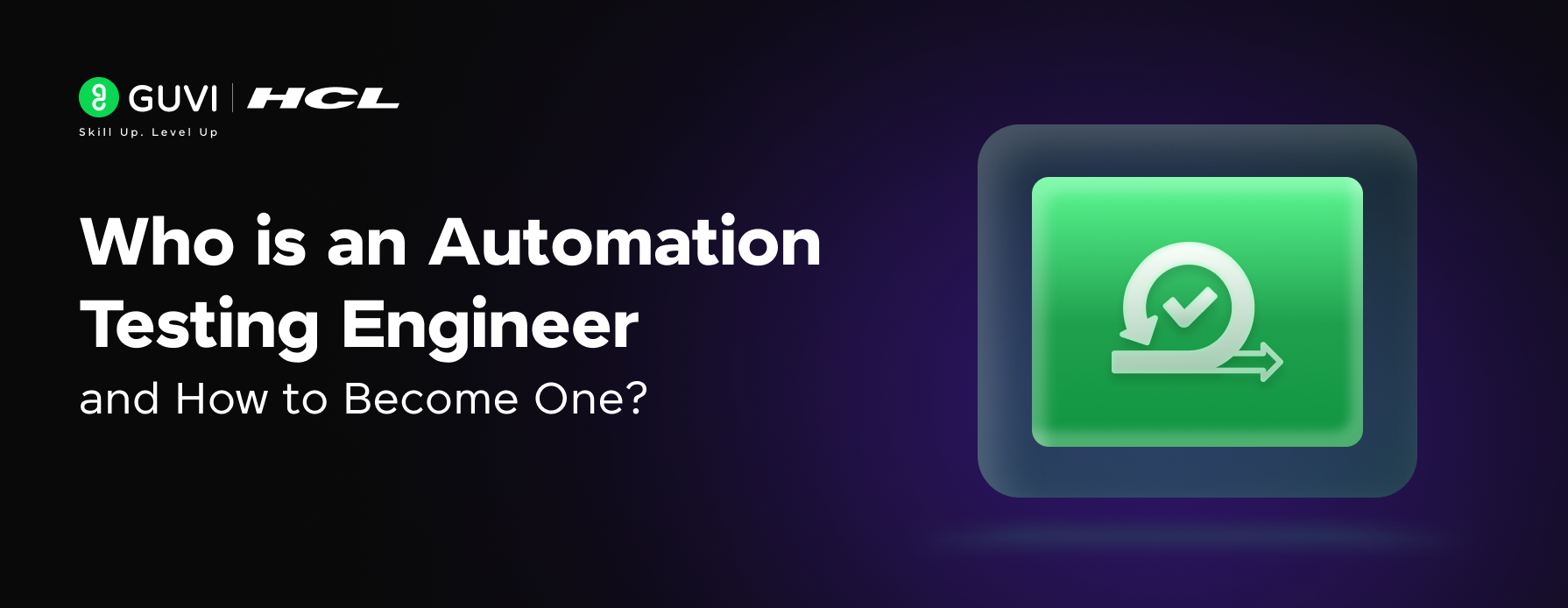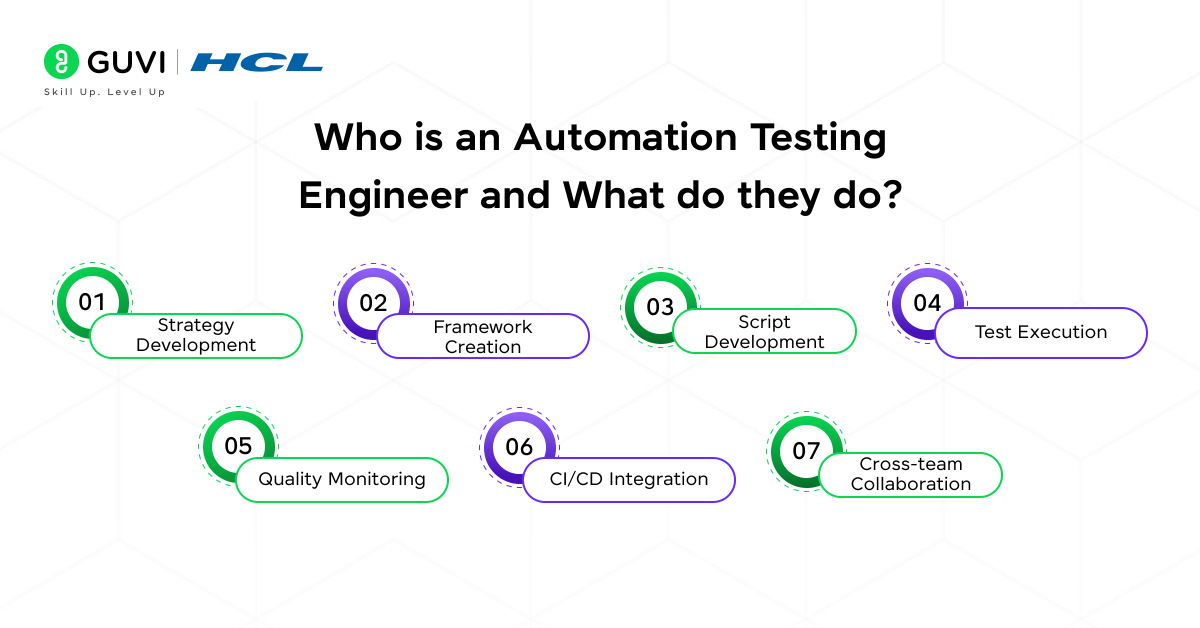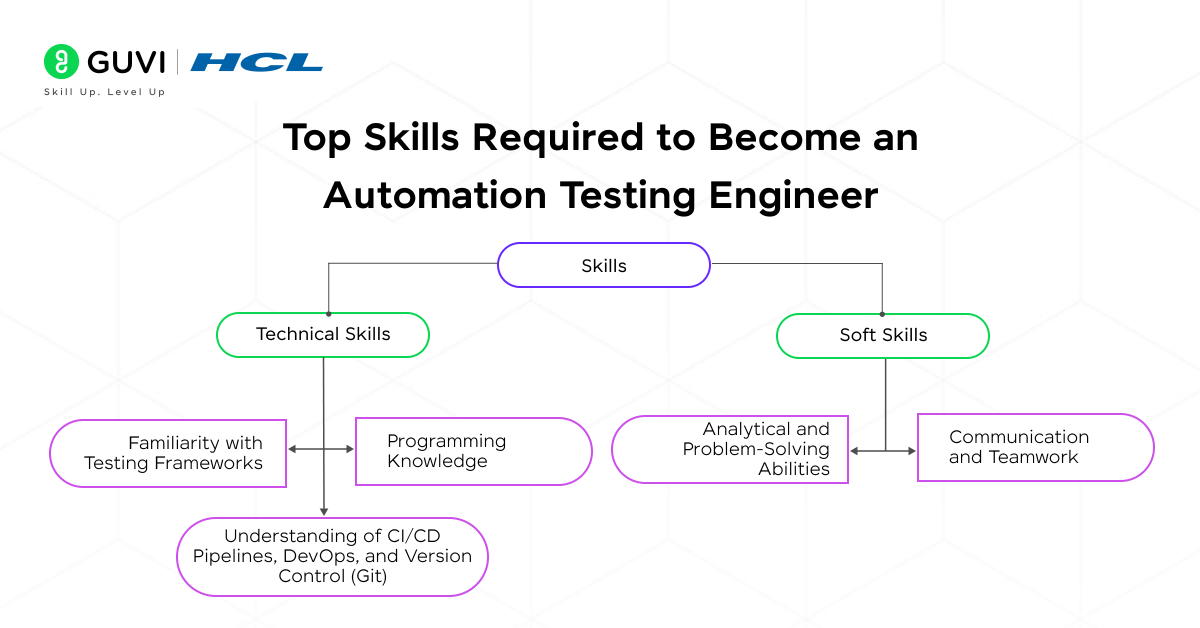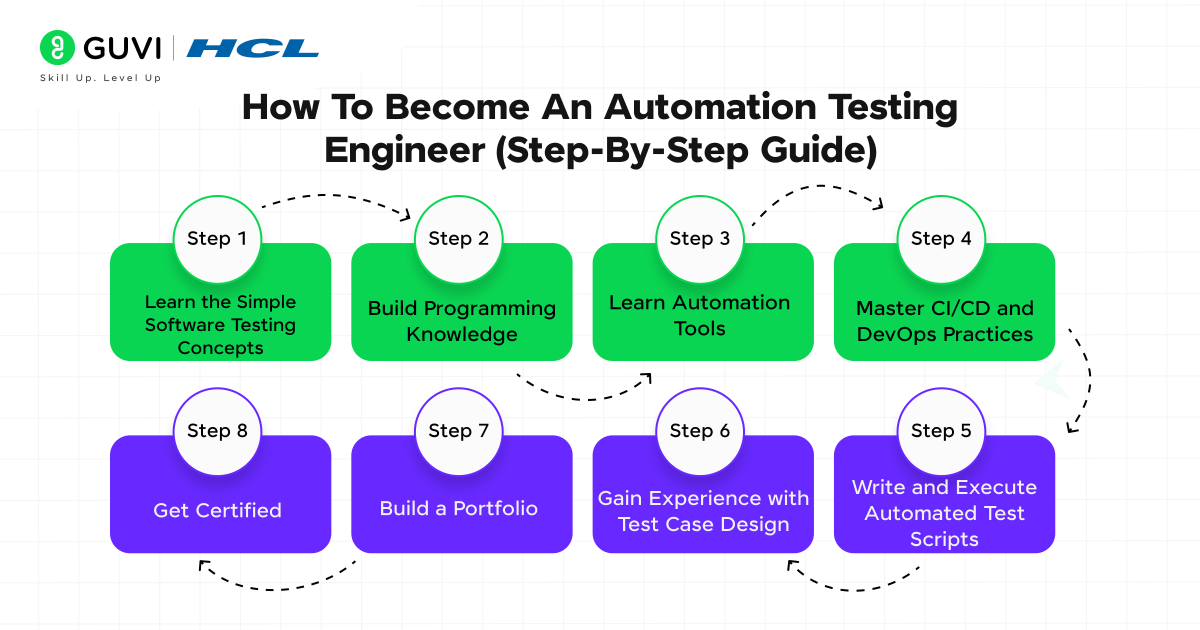
Who is an Automation Testing Engineer and How to Become One in 2025?
Mar 29, 2025 7 Min Read 8990 Views
(Last Updated)
The US Bureau of Labor Statistics projects a 25% increase in QA careers by 2032, showing significant growth in the quality assurance field. Automation testing engineers will enter a sector where digital transformation spending could reach $2.8 trillion by 2025, according to Statista.
Automation testing engineers create test designs, write automation scripts, and manage testing protocols. Companies that implement automated testing have achieved 30% better automation efficiency and reduced regression testing time by 300%. Hence, this career path’s growth potential is evident as 66% of businesses have automated at least one business function already.
Let me show you through this article what an automation testing engineer does, the skills needed, and how to build your career in this fast-growing field.
Table of contents
- Who is an Automation Testing Engineer?
- Skills Required to Become an Automation Testing Engineer
- Technical Skills
- Soft Skills
- How To Become an Automation Testing Engineer (Step-by-Step Guide)
- Step 1: Learn the Simple Software Testing Concepts
- Step 2: Build Programming Knowledge
- Step 3: Learn Automation Tools
- Step 4: Master CI/CD and DevOps Practices
- Step 5: Write and Execute Automated Test Scripts
- Step 6: Gain Experience with Test Case Design
- Step 7: Build a Portfolio
- Step 8: Get Certified
- Career Path, Roles and Salaries in Automation Testing
- Concluding Thoughts…
- FAQs
- Q1. What skills are essential for becoming an automation testing engineer?
- Q2. How does the career progression look for automation testing engineers?
- Q3. What is the salary range for automation testing engineers in India?
- Q4. How does automation testing differ from manual testing?
- Q5. What future trends should automation testing engineers be aware of?
Who is an Automation Testing Engineer?
An Automation Testing Engineer is a specialized software developer who designs, programs, and runs automated tests to assess new or existing software applications. These professionals use programming knowledge to create scripts and frameworks that run tests automatically. This approach improves efficiency and consistency in the quality assurance process, unlike traditional manual testing.
‘Quality guardians with technical expertise’ best describes these professionals. They build sophisticated systems to catch issues before users see them. Automation testing engineers mix programming expertise with quality assurance skills to check software functionality without manual work.
The industry lists Automation Testing Engineers under various job titles:
- QA Automation Engineer
- Test Automation Engineer
- Automation Systems Engineer
- Automation Specialist
- Test Automation Developer

These positions share the same core responsibilities and skill requirements, despite their different names.
Primary Functions:
Automation Testing Engineers do much more than run tests. They participate throughout the software development lifecycle and take on multiple roles as projects grow. Their complete involvement has:
- Strategy Development: Finding areas in software development processes where automation works best.
- Framework Creation: Building reliable test automation frameworks that help run tests efficiently.
- Script Development: Creating code that runs automated testing of applications, usually with Java, JavaScript, Python, or C#.
- Test Execution: Running automated tests and studying results to find bugs or quality issues.
- Quality Monitoring: Following and reporting defects during development.
- CI/CD Integration: Creating continuous integration and deployment pipelines that run automated tests with each code change.
- Cross-team Collaboration: Working with developers, product managers, and other team members to line up testing with business needs.
Automation Testing Engineers watch over quality throughout software development. They use technical skills to make sure applications work well in different situations. Their work cuts down software defects that users might see and leads to better user experiences and successful software products.
Skills Required to Become an Automation Testing Engineer
Companies are changing from traditional manual testing to automation. They just need professionals who can combine technical expertise with quality assurance. Today’s automation testing engineer needs a diverse toolkit that combines technical prowess with soft skills. Let’s take a closer look at the essential skills you’ll need to thrive in this field.

Technical Skills
1. Programming Knowledge (Python, Java, JavaScript, C#)
Programming knowledge builds the foundation of automation testing. You must know at least one programming language to write effective test scripts. The most accessible programming languages in automation testing are:
- Java is widely used with Selenium, making it one of the most preferred choices.
- Python is gaining popularity due to its simplicity and support for automation frameworks like PyTest and Robot Framework.
- JavaScript is essential for web-based automation testing using frameworks like Cypress and WebDriverIO.
- C# is often used in enterprise applications and is compatible with Selenium and NUnit.
Knowing at least one programming language helps testers write efficient test scripts, debug automation code, and integrate with development workflows.
2. Familiarity with Testing Frameworks (Selenium, JUnit, TestNG)
Automation testing engineers must be proficient in using testing frameworks that help create, execute, and manage test scripts efficiently. Some key frameworks include:
- Selenium – The most widely used open-source framework for web automation testing. It supports multiple browsers and integrates with Java, Python, and C#.
- JUnit & TestNG – Testing frameworks primarily used for unit testing and automation in Java-based projects. They provide annotations, test case management, and reporting features.
- Appium – Essential for mobile automation testing (Android & iOS).
- Cucumber – A behavior-driven development (BDD) framework that helps testers write test cases in simple, readable language.
A strong understanding of these frameworks enables automation testers to design robust test cases, automate repetitive tasks, and improve test efficiency.
3. Understanding of CI/CD Pipelines, DevOps, and Version Control (Git)
Automation testing engineers work closely with development and DevOps teams to ensure smooth software delivery. Continuous Integration and Continuous Deployment (CI/CD) is a key part of modern software testing. Understanding:
- Jenkins, GitHub Actions, CircleCI, and GitLab CI/CD help in integrating automated tests into the deployment pipeline.
- Docker & Kubernetes knowledge helps in containerized testing environments.
- Git (Version Control) is essential for managing test scripts, tracking changes, and collaborating with teams.
These skills ensure that automated tests are seamlessly integrated into the software development lifecycle, improving efficiency and reducing manual effort.
Soft Skills
1. Analytical and Problem-Solving Abilities
Analytical thinking is essential for automation testers. This skill helps you tackle complex software issues step by step, breaking them into manageable parts. Through analytical thinking, you can:
- Create quick solutions to testing challenges
- Build detailed test cases covering critical aspects
- Find the best areas for automation implementation
Problem-solving skills matter because you’ll often face scenarios where automated tests show errors despite working applications. Sometimes scripts show success while actual applications have errors. Good automation engineers can debug these issues quickly with their knowledge of automation tools and troubleshooting techniques.
You should analyze requirements from a testing point of view. Business requirements need a clear understanding of functionality from an automation standpoint. This helps identify potential challenges in implementing test automation.
2. Communication and Teamwork
Automation testing engineers work in agile teams and collaborate with developers, QA testers, and DevOps engineers. Effective communication ensures that test cases are well-documented, defects are reported clearly, and project goals are aligned. Testers should also be able to explain complex automation processes in simple terms to non-technical team members.
How To Become an Automation Testing Engineer (Step-by-Step Guide)
Starting your experience to become an automation testing engineer needs a well-laid-out approach and steady effort. Our previous sections covered who these professionals are and their needed skills. Now let’s explore the practical steps to enter this dynamic field. This guide will help you direct your path to become a skilled automation testing engineer in 2025.

Step 1: Learn the Simple Software Testing Concepts
A strong foundation in software testing principles comes before automation. You’ll find it hard to automate without knowing what to test and why.
Start by learning:
- Software Testing Life Cycle (STLC)
- Various testing types (functional, performance, security)
- Test planning and execution methodologies
- Defect tracking and reporting
The best automation testers usually start with manual testing experience. This helps you develop a “testing mindset” and intuition that proves valuable when creating automation frameworks later. Most experts suggest 6-12 months in manual testing roles builds this foundation.
Learn Agile methodology and the Scrum framework at the same time. These methods shape how you test and are accessible to more people in the industry. Get hands-on practice with defect tracking and test management tools. These form the core of testing workflows.
Step 2: Build Programming Knowledge
Testing basics come first. Your next focus should be programming skills. Test automation creates programs to test other programs.
Pick one programming language and become skilled at it before adding more. Python suits beginners because it’s easy to read and simple. Java stays popular in enterprise settings. JavaScript, C#, and Ruby work well too.
Beyond basic syntax, learn:
- Object-oriented programming concepts
- Control structures (loops, conditionals)
- Data structures (lists, dictionaries)
- Error handling mechanisms
- Functions and methods
Create simple automation scripts that do basic tasks to gain real-life experience. To name just one example, write a script that searches Google using a browser automation tool. Hands-on practice teaches better than theory alone.
Code every day to build muscle memory and fluency. Just 1-2 hours of steady practice leads to substantial progress.
Step 3: Learn Automation Tools
Programming basics set the stage. Next comes mastering automation testing tools that match your target area.
Choose tools based on your testing focus:
- Web applications: Selenium WebDriver, Cypress, TestCafe
- Mobile applications: Appium, XCUITest, Espresso
- API testing: Postman, SoapUI, RestAssured
- Desktop applications: WinAppDriver, AutoIT, TestComplete
- Performance testing: JMeter, Gatling, LoadRunner
Selenium WebDriver leads web automation and makes a great starting point. The market keeps changing. Open-source solutions now replace older tools like QTP (Quick Test Professional).
Your learning should include:
- Setting up the tool on your computer
- Finishing tutorials and sample projects
- Building your project to automate a real website
- Joining community forums to solve problems
Know how these tools work, their limits, and the best ways to use them. This deep knowledge helps you make smart choices about automation strategies at work.
Step 4: Master CI/CD and DevOps Practices
Today’s automation testing fits into Continuous Integration/Continuous Delivery (CI/CD) practices. This knowledge is vital for an automation testing engineer in 2025.
CI/CD automation testing makes building, testing, and deploying apps faster. Quick feedback to developers through CI/CD pipelines depends on good automation testing strategies.
Learn these key concepts:
- Version control systems (particularly Git)
- Continuous integration tools (Jenkins, GitLab CI, CircleCI)
- Containerization (Docker, Kubernetes)
- Infrastructure as code
See how automated tests fit into CI/CD pipelines to catch issues early. Teams can find defects faster, which speeds up releases while keeping quality high.
Add automated testing at each pipeline stage as you grow. This ranges from unit testing during builds to regression testing before deployment. Understanding these workflows makes you more valuable to employers.
Step 5: Write and Execute Automated Test Scripts
Once you have a solid understanding of automation testing tools and frameworks, the next step is to write and execute automated test scripts. These scripts help automate repetitive test cases, reducing manual effort and improving efficiency.
Start by selecting a programming language (Java, Python, JavaScript) and learning how to write test scripts using tools like Selenium, Appium, JUnit, or TestNG. Implement these scripts in real-world scenarios, such as web applications, mobile apps, or APIs, to gain hands-on experience.
Additionally, contribute to open-source projects on GitHub or participate in automation testing projects on platforms like Upwork, Freelancer, or Kaggle. This will not only enhance your problem-solving skills but also help you build a strong portfolio that showcases your expertise.
Step 6: Gain Experience with Test Case Design
A well-designed test case ensures thorough testing of software functionality. As an Automation Testing Engineer, you must learn to create detailed test plans and test cases to cover all possible scenarios.
There are three key types of test cases:
- Positive Test Cases – These verify that the system works as expected when given valid inputs.
- Negative Test Cases – These check how the system behaves when invalid or unexpected inputs are provided.
- Edge Cases – These test the system’s limits, such as inputting extreme values or handling unexpected behaviors.
Practicing these test case design techniques will help you identify potential bugs and ensure software reliability. Tools like TestRail, Zephyr, and qTest can be used for test case management.
Step 7: Build a Portfolio
A strong portfolio increases your chances of landing a job as an Automation Testing Engineer. Your portfolio should demonstrate:
- Automated test scripts are created using tools like Selenium, Cypress, or Appium.
- Projects showcasing real-world automation testing scenarios.
- Case studies on how you identified and resolved software bugs using automation.
The best way to showcase your work is by creating a GitHub repository with your test scripts and projects. Additionally, you can build a personal website or a LinkedIn profile to display your expertise and contributions to open-source testing projects.
Step 8: Get Certified
Certifications validate your automation testing skills and improve your job prospects. Some of the most recognized automation testing certifications include:
- ISTQB (International Software Testing Qualifications Board) – Covers fundamental, advanced, and expert-level testing principles.
- Certified Software Tester (CSTE) – Focuses on software testing standards, principles, and processes.
- Certified Associate in Software Testing (CAST) – Ideal for beginners looking to gain foundational knowledge in testing.
- GUVI Selenium Automation Testing Certification – A hands-on certification that focuses on Selenium-based test automation, making it highly relevant for industry needs.
Earning these certifications will help you stand out in job applications and showcase your expertise to potential employers.
Career Path, Roles and Salaries in Automation Testing
The career path for automation testing professionals offers great opportunities as companies welcome digital transformation. The software testing market will reach USD 50 billion by 2026, growing at 19% annually.

This growth creates many career paths and competitive pay packages for skilled automation testing engineers. Look at the table below:
| Role Level | Job Titles | Description | Salary (₹ LPA) |
| Entry-Level | QA Tester, Automation Test Intern | Understand software testing fundamentals, write & execute test cases, learn automation tools (Selenium, JUnit, Appium). | 4 – 6 |
| Mid-Level | Automation Test Engineer, Software Tester | Develop and maintain automation scripts, optimize testing frameworks, and integrate automation into CI/CD pipelines. | 8 – 15 |
| Senior-Level | Senior Automation Engineer, Test Lead | Define organization-wide testing strategies, manage automation frameworks, and ensure software quality at scale. | 18 – 25 |
| Advanced-Level | QA Manager, DevOps Engineer | Define organization-wide testing strategies, manage automation frameworks, ensure software quality at scale. | 25+ |

Success in automation testing depends on balancing technical skills with business understanding. Tobias Müller said, “It’s not about trusting artificial intelligence anymore; it’s about setting boundaries and trusting what you set”. His point of view highlights human judgment’s lasting importance as automation capabilities advance.
Also, if you wish to learn in-depth about an automation engineer’s roles and responsibilities, then read our blog on Automation Test Engineer Roles and Responsibilities in 2025.
Concluding Thoughts…
Well, after this article, we can conclude that automation testing is a dynamic career choice that promises substantial growth through 2025 and beyond. Companies are speeding up their digital transformation, and market projections show excellent opportunities ahead.
Fresh graduates can expect starting salaries between INR 3-6.5 LPA. These salaries can grow by a lot to INR 12+ LPA within 3-5 years, which makes this career path rewarding. Your success depends on becoming skilled in technical areas like programming and automation tools. You also just need strong soft skills, such as analytical thinking and communication abilities.
This field provides clear growth opportunities. You can progress from automation specialist to architect roles, and each step brings new challenges and rewards. Starting your automation testing career today could help shape software quality assurance’s future with your technical expertise and problem-solving skills.
FAQs
Key skills include programming knowledge (e.g., Python, Java), proficiency in automation tools like Selenium, understanding of CI/CD practices, analytical thinking, and strong communication abilities. Continuous learning is crucial to keep up with evolving technologies.
Typically, professionals start as junior automation engineers, progress to senior testers, then advance to roles like QA team coordinator, QA manager, and potentially QA architect or principal QA. The path involves increasing responsibilities in test planning, strategy development, and team leadership.
Entry-level salaries range from INR 3 LPA to 6.5 LPA. With 3-5 years of experience, this can increase to INR 7.5-12 LPA. Senior professionals with specialized skills can earn significantly more, especially compared to manual testing roles.
Automation testing uses scripts and tools to run tests automatically, offering faster execution and consistency for repetitive scenarios. Manual testing, performed by humans, is better suited for exploratory testing and scenarios requiring human judgment. Effective QA strategies often incorporate both methods.
Emerging trends include AI and machine learning integration, low-code/no-code testing tools, and testing for IoT and blockchain technologies. Professionals should also be prepared for the increasing importance of codeless testing solutions and the need to balance technical skills with business understanding.































Did you enjoy this article?